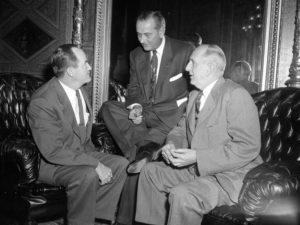Patriarchy, power and greed.
Sen. Lyndon B. Johnson (center) confers with Sens. Hubert H. Humphrey (left) and Sen. Richard B. Russell in 1954. Johnson was elevated to majority leader in 1955 and rapidly grew into the job.
It wasn’t the Founders who wanted centralized power in the Senate. That came about a hundred years later. And then, in the 90’s, Mitch McConnell, a master diabolical political manipulator with one goal.
“McConnell has been crucial in securing the single clearest accomplishment of the Trump presidency to date – the confirmation of more than 130 federal judges, including two Supreme Court justices.”
NPR
How Does One Man Have So Much Power Without Being President?
by Ron Elving
Mitch McConnell, the Republican senator from Kentucky.
The man who calls himself the “Grim Reaper” — of signature Democratic initiatives.
McConnell’s status stems from his office as the Senate majority leader — elected by his party colleagues to lead their conference in the chamber. But few who have held this office have been able to wield it with this kind of results.
In today’s Senate, McConnell can decide virtually by himself what the chamber will do — and even what it will consider doing.
Control of the Senate was very much up for grabs in the 2016 cycle, and, at times, it appeared likely Trump would lose to Hillary Clinton and depress Republican turnout in the process. That was seen as damaging or even fatal to the prospects of several Republicans in close races.
McConnell could see his status in the majority slipping away after having it just two years. So he calibrated his responses to campaign events carefully. At one point, he simply refused to take any questions at all regarding the party’s presidential nominee.
Nonetheless, when Trump won, McConnell was right there to offer his full-throated support. And within days, the new relationship was cemented by Trump’s appointment of McConnell’s wife, Elaine Chao, as secretary of transportation. (Chao had been secretary of labor for all eight years of George W. Bush’s presidency.)
While their backgrounds and lifetime experiences are worlds apart, McConnell and Trump share an approach to politics that is more transactional than ideological.
The Founding Fathers saw the Senate as a small body (initially about two dozen) that would largely govern itself, under the watchful eye of the president of the Senate — a job assigned to whoever happened to be vice president of the United States. If the veep was unavailable, the task of presiding passed to a senator designated as the Senate president pro tempore — the presiding officer for the time being.
As the Senate evolved, the idea of the presiding officer atrophied in importance. The vice president stopped attending Senate sessions except for ceremonial occasions or to cast a tiebreaking vote. The Senate was largely run by its strongest personalities and committee chairmen.
The Trump era, at least on Capitol Hill, is best understood as the Trump-McConnell era.


Leave a Reply